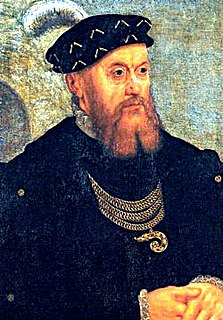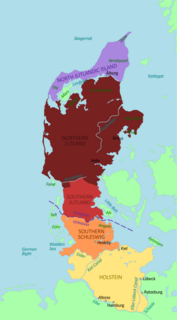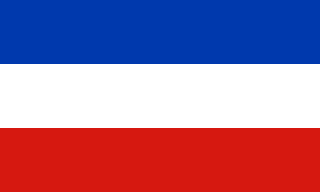
The Duchy of Schleswig was a duchy in Southern Jutland (Sønderjylland) covering the area between about 60 km north and 70 km south of the current border between Germany and Denmark. The territory has been divided between the two countries since 1920, with Northern Schleswig in Denmark and Southern Schleswig in Germany. The region is also called Sleswick in English.

The Lateran Treaty was one of the Lateran Pacts of 1929 or Lateran Accords, agreements made in 1929 between the Kingdom of Italy and the Holy See, settling the "Roman Question". They are named after the Lateran Palace, where they were signed on 11 February 1929. The Italian parliament ratified them on 7 June 1929. It recognized Vatican City as an independent state, with the Italian government, at the time led by Benito Mussolini as prime minister, agreeing to give the Roman Catholic Church financial compensation for the loss of the Papal States. In 1947, the Lateran Treaty was recognized in the Constitution of Italy as regulating the relations between the state and the Catholic Church.

Christian III reigned as King of Denmark from 1534 until his death, and King of Norway from 1537 until his death. During his reign, Christian established Lutheranism as the state religion within his realms as part of the Protestant Reformation.

Holstein is the region between the rivers Elbe and Eider. It is the southern half of Schleswig-Holstein, the northernmost state of Germany.

The history of Schleswig-Holstein consists of the corpus of facts since the pre-history times until the modern establishing of the Schleswig-Holstein state.

The Reichskonkordat is a treaty negotiated between the Vatican and the emergent Nazi Germany. It was signed on 20 July 1933 by Cardinal Secretary of State Eugenio Pacelli, who later became Pope Pius XII, on behalf of Pope Pius XI and Vice Chancellor Franz von Papen on behalf of President Paul von Hindenburg and the German government. It was ratified September 10, 1933 and it has been in force from that date onward. The treaty guarantees the rights of the Roman Catholic Church in Germany. When bishops take office Article 16 states they are required to take an oath of loyalty to the Governor or President of the German Reich established according to the constitution. The treaty also requires all clergy to abstain from working in and for political parties. Nazi breaches of the agreement began almost as soon as it had been signed and intensified afterwards leading to protest from the Church including in the 1937 Mit brennender Sorge encyclical of Pope Pius XI. The Nazis planned to eliminate the Church's influence by restricting its organizations to purely religious activities.

Pietro Gasparri, GCTE was a Roman Catholic cardinal, diplomat and politician in the Roman Curia and the signatory of the Lateran Pacts. He served also as Cardinal Secretary of State under Popes Benedict XV and Pope Pius XI.

The Roman Catholic Diocese of Metz is a diocese of the Latin Rite of the Roman Catholic Church in France. In the Middle Ages it was a prince-bishopric of the Holy Roman Empire, a de facto independent state ruled by the prince-bishop who had the ex officio title of count. It was annexed to France by King Henry II in 1552; this was recognized by the Holy Roman Empire in the Peace of Westphalia of 1648. It formed part of the province of the Three Bishoprics. Since 1801 the Metz diocese has been a public-law corporation of cult.
The 1925 concordat (agreement) between the Holy See and the Second Polish Republic had 27 articles, which guaranteed the freedom of the Church and the faithful. It regulated the usual points of interests, Catholic instruction in primary schools and secondary schools, nomination of bishops, establishment of seminaries, a permanent nuncio in Warsaw, who also represents the interests of the Holy See in Gdańsk. It was considered one of the most favorable concordats for the Holy See, and would become a basis for many future concordats.
The Concordat of 2004 was an agreement between Portugal and the Holy See of the Roman Catholic Church. The concordat was signed on 18 May 2004 by Angelo Sodano, Cardinal Secretary of State, for the Holy See and José Manuel Durão Barroso, Prime Minister of Portugal, for the Portuguese Republic. It has 33 articles, and supersedes the Concordat of 1940, renewing the relations between the Catholic Church and Portugal, redefining the status of this religion in the Portugal. Articles refer to aspects like religious holidays, religious marriage, organization of the Church, fiscal rights, freedom of cult and schools.

The most widely professed religion in Croatia is Christianity and a large majority of the Croatian population declare themselves to be members of the Catholic Church. Croatia has no official religion and Freedom of religion is a right defined by the Constitution of Croatia, which also defines all religious communities as equal in front of the law and separate from the state.
A treaty of the Holy See is called a Concordat. This is a list.
During the pontificate of Pope Pius XI (1922-1939), the Weimar Republic transitioned into Nazi Germany. In 1933, the ailing President von Hindenberg appointed Adolf Hitler as Chancellor of Germany in a Coalition Cabinet, and the Holy See concluded the Reich concordat treaty with the still nominally functioning Weimar state later that year. Hoping to secure the rights of the Church in Germany, the Church agreed to a requirement that clergy cease to participate in politics. The Hitler regime routinely violated the treaty, and launched a persecution of the Catholic Church in Germany.
Concordats between the Holy See and individual German states were concluded both before and after the unification of Germany in the 1870s. Early examples include:
The Concordat of 2008 was an agreement between the Catholic Church and Brazil, signed in the Vatican in the presence of the President of Brazil, Luiz da Silva on 13 November 2008. Some congressmen wanted to change the concordat, however, as with any other international treaty, once it had been signed, it could not be modified by Brazil without Vatican approval, only accepted or rejected as a whole. After much controversy it was ratified on 7 October 2009. The Association of Brazilian Magistrates opposed the concordat, as did some congressmen and Protestant groups. They objected that Brazil's constitution enshrines separation of church and state and forbids the creation of “distinctions between Brazilians or preferences favoring some.” An atheist spokesman called the concordat “an instrument of evangelization at the expense of the state and all Brazilian citizens.” The Catholic Bishops, however, denied that there was any conflict between the concordat and the constitution.

The Concordat in Alsace-Moselle is the part of the Local law in Alsace-Moselle relating to the official status accorded to certain religions in these territories.

Croatia–Holy See relations refer to the bilateral relationship between Croatia and the Holy See. Diplomatic relations among two countries were established on February 8, 1992 following Croatia's independence from SFR Yugoslavia, although they date far back in history. Croatia has an embassy in Rome, and the Holy See has an apostolic nunciature in Zagreb.
















